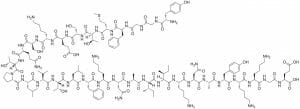Euphoria Definition
Euphoria refers to an affective state characterized by feelings of intense pleasure, happiness, contentment, and excitement. A state of euphoria can be naturally induced (e.g., in response to exercise, social activities, romance/sexual response, and artistic endeavours), chemically induced (e.g., recreational drug use), or the result of a neurological condition (e.g., mania).
Types of Euphoria
There are several types of euphoria, each induced by different mechanisms and involve various neurological pathways. Such types of euphoria are described in greater detail below:
Exercise-Induced Euphoria
Euphoria can be induced by prolonged aerobic exercise, often referred to as a “runner’s high”. Exercise induces euphoria through the dopamine pathway through the synthesis of -endorphin (molecule pictured below), anandamide, and phenethylamine. As such, exercise in the form of running, cycling, and other aerobic activities is recommended as an adjunct treatment for addiction, neurodegenerative disorders (e.g., Parkinson’s and Alzheimer’s), and major depressive disorder. Studies have shown that the euphoric properties of exercise can aid in the recovery of drug addictions, function as an antidepressant, as well as improve overall cognition and brain health.
Drug-Induced Euphoria
Several common recreational drugs exhibit addictive properties due to the reward response they induce in the brain. Some of the most common drugs that induce a state of euphoria include, stimulants (e.g., amphetamine, methamphetamine, and cocaine), depressants (e.g., alcohol, barbiturates, and benzodiazepines), cannabinoids (e.g., THC in cannabis), gases (e.g., nitrous oxide), and opioids (e.g., heroine, fentanyl, codeine, morphine, and oxycodone). Some of these drugs directly induce the dopamine response (i.e., reward response), while others engage the opioid receptors (responsible for the management of stress, pain, appetite, emotion, and attachment behaviors.
Neuropsychiatric Euphoria
There are several neuropsychiatric conditions which also induce a state of euphoria in affected individuals. Such disorders include, bipolar disorder, epilepsy, and migraine headaches. In individuals with bipolar disorder (and some other conditions), euphoria is associated with periods of mania, which involve rapid speech, delusions of grandeur, and increased flight of ideas. In some individuals with epilepsy or affected by migraine headaches, euphoria may be associated with the onset or after the resolution of symptoms. Although the precise mechanisms remain unknown, a euphoric state associated with these conditions is thought to be attributed to the disrupted brain chemistry that occurs during the progression of either a migraine headache or epilepsy.
Quiz
1. Which of the following is NOT associated with the induction of euphoria?
A. Exercise
B. Cocaine
C. Bipolar disorder
D. Major depressive disorder
2. Which of the following statements is TRUE regarding euphoria:
A. Listening to music can induce euphoria.
B. Sexual stimulation can induce euphoria.
C. Euphoria can be associated with migraine headaches.
D. Euphoria is associated with the reward/pleasure response in the brain.
E. All of the above.
References
- Grossman et al. (1984). The role of opioid peptides in the hormonal responses to acute exercise in man. Clin Sci (Lond). 67(5):483-91.
- Harber VJ and Sutton JR. (1984). Endorphins and exercise. Sports Medicine. 1(2):154-71.
- Mellion MB. (1985). Exercise therapy for anxiety and depression. 2. What are the specific considerations for clinical application? Postgrad Med. 77(3):91-3, 95, 98.

